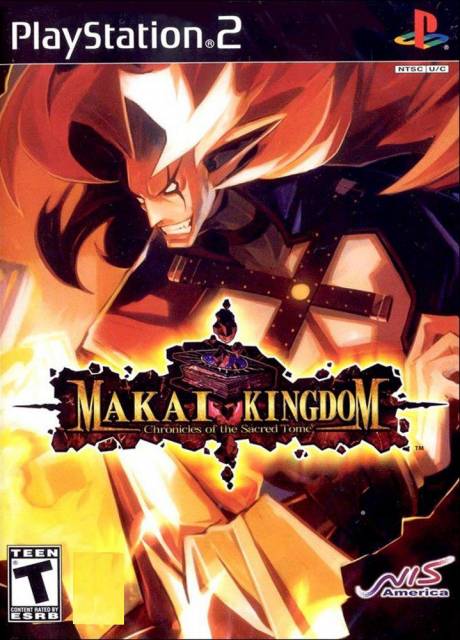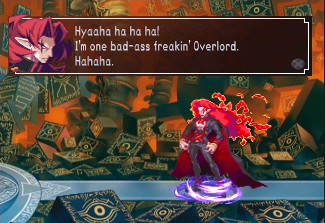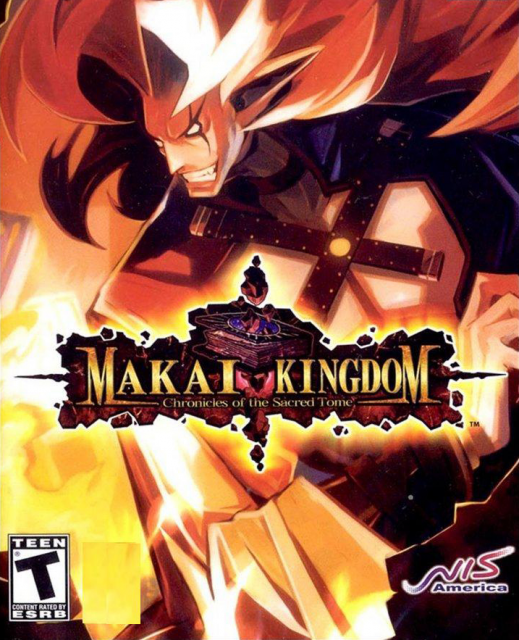Welcome to The Top Shelf, a weekly feature wherein I sort through my extensive PS2 collection for the diamonds in the rough. My goal here is to narrow down a library of 185 games to a svelte 44: the number of spaces on my bookshelf set aside for my PS2 collection. That means a whole lot of vetting and a whole lot of science that needs to be done - and here in the second round, that means narrowing our laser focus to one game per week (at least). Be sure to check out the Case File Repository for more details and a full list of games/links!
Extra Note: We've entered Shelftember! In this much-vaunted month, we will be processing one of the second round entries every day. I'll be spending one hour apiece with each game - inspired by DanielKempster's backlog-clearing series "An Hour With..." - and determining its fate from there.

It was with some degree of trepidation that I booted up Makai Kingdom after holding off on it for almost the entire month of Shelftember. It almost felt like walking into a casino after overcoming a gambling addiction. The Nippon Ichi Software strategy RPGs, of which Makai Kingdom is the fourth of six from the PlayStation 2 era to see North American and European distribution, all share a certain number of characteristics: most of the basic combat mechanics and visual design is taken from isometric SRPGs like Final Fantasy Tactics and Vandal Hearts; they still use sprites in 3D environments, which was a format popularized by SRPGs for the SNES and PS1 that was starting to look its age by 2005; a certain subversive, fourth-wall-breaking sense of humor, particularly for the games that deal with the Netherworld and demons; and, most crucially for why I burned out on these back on the day, each contains a level of depth and complexity that could rival a Paradox game, and feature a nigh-bottomless degree of longevity that they could potentially be played for months on end. While the core plot progression rarely requires the player's units to move far past level 50 or so, the actual level caps for these games tend to top out at level 9999; at which point you're taking down cosmic deities with characters and equipment you've spent hundreds of hours fine-tuning through customization, grinding and farming. Each game is subtly different also, as NIS played around with new mechanics and concepts all the time. While they might look identical from a glance, each NIS SRPG is entirely its own thing with its own route to micromanagement and min-maxing nirvana.
Makai Kingdom introduces the Overlord Zetta - the strongest in the universe, or so he claims - after he is called out by the Sacred Tome (a book that details the entire history and future of every Netherworld) as an idiot that is fated to destroy his own homeland. Burning the book in anger, he realizes too late that the immolation of the Sacred Tome is what will cause his Netherworld's destruction, and he binds his soul to the book to prevent its complete annihilation. While Zetta's Netherworld collapses Zetta himself is saved by his quick actions, at the cost of being an inanimate book that cannot move on its own. From here, Zetta enlists the help of rival Overlords - those he has kept in check with his overbearing power, but whom now see a weakness to exploit - to help him rebuild his armies, his castle, his Netherworld, and his body from scratch.
Makai actually bases its gameplay model on Phantom Brave, curiously enough, which was the first of NIS's SRPGs to eschew the formal tile grid format for a loosey-goosey radial movement system that lets characters move in any direction in a straight line - this maximum distance creates the radius with which the circle of movement is formed. I'm no doubt making it sound more complicated than it actually is, but it means that it's far easier for a team of units to crowd around targets and fine-tune their area-of-effect attacks to be as inclusive as possible. It also retains, to an extent, Phantom Brave's focus on "incarnating" units through inanimate objects like trees or rocks, with the resulting living creatures inheriting certain traits from the objects used to manifest them into being. So, with the examples above, a tree would provide more health due to its vitality while a rock would confer a large defense boost. However, you don't need to do this in battle any more: the characters, once created from their objects, remain with you forever or until you disband them. They can immediately be called into battle, with each map carrying a specific limit of friendly units: so far, that total has remained steady at 8 per map but may increase the further I get and the more units I have available. You can also summon buildings into combat: these can hold multiple units, and confers bonuses to anyone who emerges from them, such as a hospital giving everyone within a 10% regeneration rate. I haven't even gotten to the point where you can bring tanks and other vehicles into combat, but that's the sort of game Makai Kingdom is shaping up to be.

I'm already enjoying the game's story and characters too. The third character to be introduced resembles a classic Final Fantasy style "final boss" type of abomination made up of several components: an angelic face, a DBZ style four-armed demon, and a massive dragon skull that contains a ball of fire in its core. However, the four-armed demon turns out to be an effete worrywort, the dragon skull an unbridled id yelling about beer and girls, and the angelic head is a manipulative mastermind with a mile-wide mean streak who is the one really calling the shots. I've also met the galaxy-sized dragon Overlord Babylon who has existed so long he's gone senile and near-blind, and the enigmatic waif Pram the Oracle who seems delighted that Zetta needs her help. The humor is a lot more meta than even Disgaea has been in the past, with the Overlords arguing about how to build a proper Netherworld and how much Zetta is at the mercy of his amused nemeses, who continue to insult him with an Overlord's castle that is actually a doghouse he can't fit into, and new Netherworlds which are filled with wild monsters and demons he must clear out first.
More enthralling than all that is the gameplay and in particular its dizzying capacity for character growth and micromanagement, which is already making itself known after just an hour into the game. Because anyone can write wishes into Book Zetta and have them come true, Zetta's underlings can use a special type of currency they earn through combat to create bonus dungeons to explore. They can also wish for other things, each carrying its own price up to and including the annihilation of that unit to make something major happen. When fighting on a map, it can be expanded in a number of ways by either killing or destroying marked key enemies and objects in the environment, or by tossing objects out-of-bounds in that direction; you can see which way a map can expand via a white grid that appears when you mouse over the abyss surrounding the map's outer contours. Each level has a score which is defined by the enemies you can kill and the objects you can collect, and going over the limit needed to successfully win the stage grants you additional post-battle prizes like new equipment, bonus XP and money, and new structures to build in Zetta's newly formed "home base" Netherworld. As in Disgaea, you unlock new unit types from defeating them in battle during the story, and unlock stronger versions of them by creating units of that type and having them reach certain level caps. At all times, Book Zetta is sitting around lending a limited amount of assistance; a unit that is level 2000 and has 40000 HP that is utterly unable to move or act. Strange doesn't even begin to describe the game, but it's all very familiar if you've played a NIS SRPG before this.
In fact, Makai Kingdom is so odd even among its siblings that I perhaps wouldn't suggest it as your first game if you were looking to break into the NIS SRPGs of the PS2 era for whatever reason. It builds from both Disgaea with its lore about how Netherworlds and Overlords work, and from Phantom Brave in how units move, act, grow and are manifested from random objects, like a spiritual sequel to both but at the same time completely disparate from either beyond the fundamental SRPG gameplay. I'll obviously need to figure out how I feel about it by playing it a whole lot more before I'm ready to select one NIS SRPG - because they are all so similar deep-down - to head to the shelf. Though, uh, since I have other PS2 games to complete I might stick it at the end of the play list, just in case it swallows up my entire autumn...
Result: Progresses to the Third Round.

Log in to comment